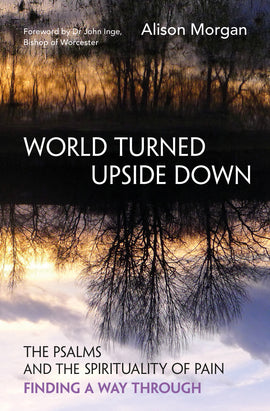The Contemplative Minister: Learning to lead from the still centre
Eugene Peterson's bestselling book The Contemplative Pastor has helped many church leaders to keep a strong spiritual centre to ministry as they are engulfed by the busyness of church life.
The church landscape has now moved on considerably since Peterson's book was published 20 years ago, both in the USA and the UK. Electronic media, multi-parish appointments and the ever increasing stress and demands of modern-day ministry have continued to challenge church leaders aggressively. Today, many are looking for a different way of being in ministry, a better way of serving Christ than the relentless busyness and pressure that have become the norm. But how?
| Title | The Contemplative Minister: Learning to lead from the still centre |
| Author | Ian Cowley |
| Description | Eugene Peterson's bestselling book The Contemplative Pastor has helped many church leaders to keep a strong spiritual centre to ministry as they are engulfed by the busyness of church life. Ian Cowley, Coordinator of Vocations and Spirituality in Salisbury Diocese, offers direction for contemplative leaders in the 21st century, drawing on his South African roots and the influence of contemplative leaders such as Desmond Tutu. He explains practically how to prioritise a relationship with God and lead others into that relationship, creating a shared ministry to allow the leader to nurture faith and spirituality amid the hectic life that is ministry today. |
| Details |
|
Eugene Peterson's bestselling book The Contemplative Pastor has helped many church leaders to keep a strong spiritual centre to ministry as they are engulfed by the busyness of church life.
The church landscape has now moved on considerably since Peterson's book was published 20 years ago, both in the USA and the UK. Electronic media, multi-parish appointments and the ever increasing stress and demands of modern-day ministry have continued to challenge church leaders aggressively. Today, many are looking for a different way of being in ministry, a better way of serving Christ than the relentless busyness and pressure that have become the norm. But how?
Ian Cowley, Coordinator of Vocations and Spirituality in Salisbury Diocese, offers direction for contemplative leaders in the 21st century, drawing on his South African roots and the influence of contemplative leaders such as Desmond Tutu. He explains practically how to prioritise a relationship with God and lead others into that relationship, creating a shared ministry to allow the leader to nurture faith and spirituality amid the hectic life that is ministry today.
This book is concerned with the central vocation of those who are called to the ordained ministry. As priests, we are called to be people in whom others may see God. There is a great hunger for God among many people today. This is a hunger which is not just for things about God, for sermons, books, talks and videos, but for God himself. A contemplative minister is someone who is called first of all to God and to his heart of love, so that the world may also know God and his love for all that he has made.
Archbishop Desmond Tutu
Ian Cowley is Vocations and Spirituality Coordinator for the Diocese of Salisbury and since 2010 has led and developed The Contemplative Minister programme in the Diocese, which has been greatly appreciated by many clergy. He has also written The Transformation Principle (2002), Going Empty Handed (1996) and A People of Hope (1993). He has been a parish priest in Natal, South Africa, and also in Cambridge and Peterborough.
To read Ian's lockdown blog, 'Wild times and the love of God', click here.
The Wycliffite issue no 1, Review of reprint (2016)
There was a time when Christian ministry offered the opportunity to spend your life in the study of God's word, in reading and reflection, in prayer and sermon preparation and in the quiet and faithful pastoral care of a community. The world has changed, and with it most of the expectations that govern church appointments. These days there are very few jobs in full time ministry which do not require a heroic combination of stamina, multi-tasking and change management. This book gives practical advice on how to nurture faith and a sense of calling amid the hectic life that is ministry today. Drawing on his experience of developing and leading training programmes in this area, Ian Cowley assesses the stresses and pressures of the job and shows how to grow into being a 'contemplative minister', prioritising a relationship of deepening love with God. He also offers guidance on leading others into that same relationship, without your own spiritual life running dry.
Review in Lead-on January 2018
'Those who work without prayer - no matter how good the work, no matter how sincere the minister - soon dry up inside.' (John Chittiter)
The Contemplative Minister aims to help us avoid this scenario. It is a good introduction to how to remain prayerful and rooted in Christ in the ups and downs of public leadership, or a good reminder for those who have read around this topic before.
In seven parts it covers vocation, contemplative ministry, prayer, rooted in Jesus, letting go, contemplative living, and becoming a contemplative church. Throughout Cowley refers to a wide body of material and offers practical insights into how to shape a contemplative life.
The chapters on rules and exercises and on spiritual formation are particularly helpful. Cowley outlines eight spiritual disciplines that he has found are core to the contemplative life, including detachment, attentiveness, gratitude and servanthood. For example, he encourages us to use the opportunities daily life affords to learn detachment: when stuck in a traffic jam, when a train is delayed, when we become ill at an inconvenient time, etc.
For Cowley 'spiritual formation means being formed into the likeness of Jesus for the sake of others.' This book certainly helps with that process. My guess is that it will be even more helpful if we study it with others and gain some accountability for putting into practice some of the helpful ideas it contains. Lead-on is the monthly newsletter of the CPAS www.cpas.org.uk/leadon
The Church Times - 4 November 2016
Though saved by grace, we act as if we are saved by works, busily ministering in a hyperactive Church and hectic world. Ian Cowley's counter-cultural book presents a heady foil to frenetic activity, questioning the need for it, seeing being contemplative as non-negotiable, even seeking it when busyness just cannot be avoided.
In his bracing foreword, Desmond Tutu urges us simply to accept that we are accepted. Quoting Evelyn Underhill, 'Christ was trained in a carpenter's shop, but we persist in preferring a confectioner's shop,' Tutu fears that frantic activity is both a distraction and avoidance of faith's core demands - whereas being assured of God's love fires you to truckle to no man, and even face martyrdom.
Cowley presents an immensely readable tour de force through vocation; several methods of prayer; being rooted in Jesus; and letting go to enable our ministry, living and Church to be grounded in contem plation. Priests are called both to be and to do, finding what is life-giving and doing it; but also, by their sheer holiness, drawing in others to do tasks they cannot or should not do.
With poignant examples from his ministry in South Africa, Sheffield, Cambridge, Peterborough and Salisbury, Cowley is blisteringly honest about when ministry was sheer hard slog, when he projected a 'false self' and failed to 'let go and let God'. The varied strategies that he outlines to reconnect with contemplative ministry have a hard-won and grounded feel.
There is a galaxy of quotations. Billy Connolly sees vocation as akin to wandering through a city centre and noting which shop window you are drawn to. Eugene Peterson avoids burnout by diarising two-hour appointments with FD three times per week. FD stands for Fyodor Dostoevsky!
The best was from Henri Nouwen: 'The leader of the future will be the one who dares to claim his irrelevance in the contemporary world as a divine vocation that allows him or her to enter into a deep solidarity with the anguish underlying all the glitter of success and to bring the light of Jesus there.' That rules Henri out of the Lambeth Talent Pool, then.
The Rt Revd David Wilbourne is the Assistant Bishop of Llandaff
The Reader Spring 2016
'Remember, Ian, being comes before doing'. These words spoken to the author as a young man are at the heart of this volume. Subtitled 'Learning to lead from the still centre' Cowley is at pains to stress that this is not dependent on outward circumstances, and that we do not need to go out of the world to find God. Seven distinct sections take us on a journey from vocation, through contemplative ministry, prayer, being rooted in Jesus, letting go, contemplative living, and becoming a contemplative church. The book contains not only the author's personal experience but also is full of thought provoking examples and references which will inspire us on our own journey. Written primarily for clergy, there is more than enough food for thought for both established Readers and those seeking their calling. A compelling read at whatever stage of ministry we may be.
Liz Pacey
The Contemplative Minister: Learning to lead from the still centre by Ian Cowley Reading is a book for our time, fit for reading over Christmas, before you head back into the maelstrom, to survive the pressures on your time. All of us are ministers; all of us need to be contemplatives. This book, by an evangelically-minded Anglican priest who has imbibed some of the riches of the Catholic tradition of spirituality, is for you.
Nicholas King: The Tablet 10 December 2015.The Tablet Books of the Year 2015
Julian Meeting Magazine December 2015
I was drawn to this book by the title. As a clergy wife and long-time member of Julian Meetings it looked interesting, and I was not disappointed: much of this book is both inspiring and wise. Ian Cowley, as Vocations & Spiritual Adviser for the Diocese of Salisbury, developed a programme for ordained ministers. This book arose from that, so its emphasis is largely for active ministers. However, a lot in this book relates to us all whatever our vocation or calling. The book has many themes but it centres on finding the balance between 'being' and 'doing', and how the need for 'silent waiting on God' is essential in finding this balance. We are called first to a relationship with our Lord and unless that relationship is nurtured and sustained we will fail in our vocation. Alongside this Ian Cowley shows how we have to come to an understanding of our true selves: much of the time our 'false self' drives our actions, particularly our need for control and approval. So part of our journey with God is discovering the qualities of holiness and integrity. Ian Cowley is open and honest about his own experiences. As a South African he witnessed the oppression of his own people and shares insights of his ministry in this country too. I think anyone trying to follow the contemplative way will find a lot here to guide and help them. My own response was 'Alleluia': here is someone who really understands the transformative power of silence and stillness before God and can communicate this to others - quite refreshing.
Chrissie Rapsey
From Reform Magazine - November 2015
This is a profoundly attractive book. Ian Cowley is vocations and spirituality coordinator for the Diocese of Salisbury. Writing for those who exercise ordained ministry, Cowley stresses that we need to lead disciplined, consecrated lives to be effective instruments of God's peace. Daily prayer is a nonnegotiable personal discipline.
In a society obsessed with league tables and measurable success, many in ordained ministry either burn out or bail out. Cowley challenges this ethos, reminding the disciples of Jesus that being comes before doing, that we need to be rooted in the unconditional love of God.
Cowley calls us to find our deepest identity in Christ through silence, prayer, stillness and Bible reading. To be contemplative is to see that prayer allows us to descend with the mind into the heart and there to stand before the face of the Lord, who is ever present, all seeing within you.
According to Cowley, the contemplative minister will only focus on three areas of ministry: Prayer, pastoral care and preaching. Cowley believes that the Church neither accepts nor understands the contemplative minister because prayer and being in the Kingdom of God cannot be easily measured. This book draws heavily on Cowley's Anglican spirituality. Though it is principally for ordained ministers, with a bit of creative imagination, all followers of Jesus will find this book helpful. Cowley's teaching in this book is both gentle and compelling, using personal testimony and judicious quotes. At a time when the United Reformed Church is trying to discern its calling for the future, this little book is worth being still with. It would be all too easy to justify our existence to the world by being busy; Cowley reminds us that, as the Church, we are called to be experts in prayer, and he wonders where, along the way, we managed to move from keeping the Sabbath to the Protestant work ethic.
John Gordon is a church minister serving in the central Sussex area
From The Methodist Recorder - 30 October 2015
Ian Cowley is the Vocations and Spirituality co-ordinator for the Diocese of Salisbury. His new book, The Contemplative Minister - Learning to Lead from the Still Centre (Bible Reading Fellowship, GBP8.99), is addressed to ministers and priests who 'like swimmers in the open sea are only just managing to keep their heads above the waves'. There was a time when being a Christian minister or priest offered an opportunity of spending a lifetime in prayer, study, delivering sermons and exercising pastoral care within a community. Not anymore! Today the job requires such 'a heroic combination of stamina, multitasking and change management' that any awareness of God gets stifled. There are seven parts to this book - each with a couple of easily read short chapters. The whole book is written in a homely style. One can easily imagine Ian Cowley sitting with a small group of priests within the diocese and giving them the wisdom of his experience as a parish priest in South Africa, Cambridge and Peterborough.
Part One examines vocation and the difficulty of remaining in touch with God. Parts Two and Three spell out the need for the rediscovery of our true still-centre. 'Self -management of self should occupy 50 per cent of our time'. To this end he gives helpful tips about retreats, quiet days, time sheets, quietening the body, living with uncluttered space, the daily office and use of Scripture.
From Part Four the author begins to draw out biblical insights; letting peace rule our hearts, living 'in Christ Jesus' and fighting 'our adrenaline filled existence'. From part Five onwards he focuses on letting go, establishing a 'rule of life', spiritual formation and servant leadership. The book ends by describing how one establishes a 'contemplative church'.
The lack of ecumenical perspective is the main weak ness of the book, as is its failure adequately to address the circumstances of those of us who minister among aged congregations in churches of ever declining numbers. It would be wrong, however, to suggest that this book cannot be read with profit by non-Anglicans.
If Desmond Tutu is prepared to write its Foreword, then we can be certain that the subject of this book is significant!
The Rev Tom Stuckey is a former President of the Conference.
Timely and relevant. Recommend this to any ordained minister. They will need it. Ministry is a high calling. It's not about finance, admin and committees, but primarily about prayer and service. Yet this vocation is in peril of being swamped by the mundane. Worth reading for Desmond Tutu's foreword alone!
Eddie Olliffe, Together Magazine Nov/Dec 2015
Ian Cowley writes from a background of life in Christian ministry and as someone now passionately engaged in seeking to help others thrive in ministry. This short, accessible book is filled to the brim with spiritual insight, but it is in concentrated form. You will need to take time to savour it and to reflect on it, and then find ways to implement it in your life.
Cowley's contention is that in the increasingly demanding context of the 21st Century church a new way of being in ministry is needed, what he terms contemplative ministry - 'the call to an ever deepening relationship of love for God, to lead others into that relationship and to enable them to respond to God in loving service and mission' (p18).
The author is writing mainly for those ordained in the Anglican church, and the book is a call to return to values of the ordination service, and in particular a life of prayer. He urges fellow ministers to nurture their inner life with God and to be deeply rooted in Christ so that they can sustain themselves in the challenges of ministerial life. The rationale for this is that our being must undergird our doing, and that to have authority in our leadership we must first be willing to allow God to change and transform us by the Holy Spirit.
This book is never simply theoretical in approach. Cowley provides lots of practical ways by which we can deepen our inner life, and his personal illustrations give vitality to his suggestions. He writes with a warm, compassionate tone which is never idealistic or legalistic. His passion for the contemplative life is clear, but he is humble, honest and sincere as he urges his readers to consider how they live and minister.
This book though is not just about the inner life. The final section, which I found the most engaging, is about his vision for a contemplative church, a community where there is a life of prayer and deepening relationship with God, of servant ministry and living simply for the sake of others. Such a community he suggests will instinctively be missional, and this is where the future of the Church lies. I suspect his ideas here are not yet fully formed, which suggests there might well be room for a second book on The Contemplative Church.
Some ministers, already aware of the importance of the inner life, will be able to integrate Cowley's teaching into their present ministry smoothly and easily. Others may find to become more contemplative they will have to make significant changes to the foundations of how they live and work. If they do so they will reap enormous benefits.
Buy this book for yourself or someone you know in ministry. It could be a life-saver. It will certainly be a life-giver.
Tony Horsfall, author, freelance trainer and retreat leader







